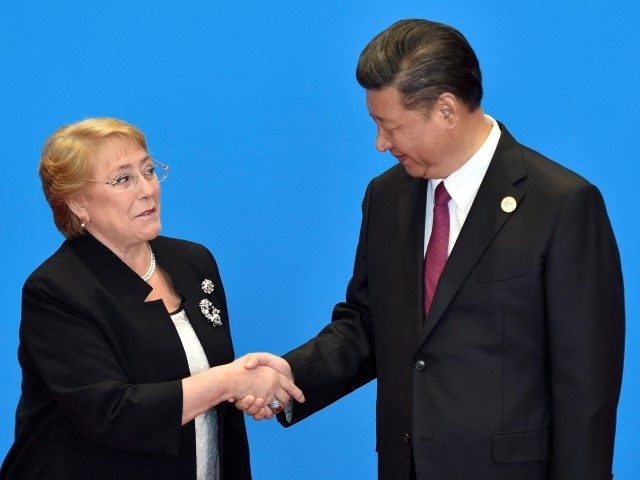United Nations High Commissioner for Human Rights Michelle Bachelet “expressed admiration for China’s efforts” on “protecting human rights” in conversation with communist dictator Xi Jinping on Wednesday, according to the Chinese Foreign Ministry.
Bachelet — a two-time socialist president of Chile who used her tenure to sign a free trade agreement with China and bring the South American country deep into Beijing’s economic orbit — is in occupied East Turkistan this week to investigate extensive evidence that Xi is orchestrating an ongoing genocide against ethnic minorities in the region, particularly the Uyghur people.
On Tuesday, as Bachelet settled in for her visit, investigative scholar Adrian Zenz and the Victims of Communism Foundation published a giant data dump featuring thousands of photos, government training manuals, and Communist Party official speeches regarding the genocide in East Turkistan, branded the “Xinjiang Police Files” after the Mandarin name for East Turkistan.
The documents include profiles of thousands of Uyghur and other ethnic minority concentration camp prisoners. In speeches transcribed in the documents, local officials repeatedly emphasize that Xi Jinping personally ordered a campaign to “break the lineages” of Uyghurs.
Bachelet has yet to comment on the document dump, which was published alongside a peer-reviewed academic article explaining how Zenz verified the authenticity of the information.
The U.N. Human Rights chief instead conducted a conversation on Thursday with Xi himself — who remains barricaded in Beijing — “via video link,” according to the Chinese Foreign Ministry.
President Xi Jinping met via video link with UN High Commissioner for Human Rights Michelle Bachelet on 25 May in Beijing. https://t.co/ERxQLreW7g pic.twitter.com/GUq5E9vtqi
— Hua Chunying 华春莹 (@SpokespersonCHN) May 25, 2022
“Ms. Bachelet expressed appreciation to China for receiving her visit despite the [Chinese coronavirus] challenge, the first visit to China by the UN High Commissioner for Human Rights in 17 years,” the Foreign Ministry relayed. “She expressed admiration for China’s efforts and achievements in eliminating poverty, protecting human rights and realizing economic and social development, and commended China’s important role in upholding multilateralism, confronting global challenges such as climate change, and promoting sustainable development across the world.”
Bachelet reportedly told Xi she wanted her office to “explore cooperation” with China “for the progress of the global human rights cause.”
The Foreign Ministry readout spent much more time replicating Xi’s comments to Bachelet, an apparent harangue claiming that there is no such thing as universal human rights – “human rights have historical, specific and practical contexts” – while demanding more influence in “global human rights governance.” Xi reportedly told Bachelet that no country has a “perfect” human rights record and that “countries do not need patronizing lecturers.”
Xi also declared victory for China in human rights efforts.
“After decades of strenuous efforts, China has successfully found a path of human rights development in keeping with the trend of the times and China’s national reality,” Xi was paraphrased as saying. “We have been advancing whole-process people’s democracy, promoting legal safeguard for human rights and upholding social equity and justice. … The human rights of the Chinese people are guaranteed like never before.”
The Chinese Foreign Ministry did not indicate that Bachelet challenged Xi’s claim of complete success in protecting human rights or raised any of the many human rights atrocities China stands accused of, from genocide against the Uyghur people to the cultural erasure of Tibetans and Mongolians to the mass arrests and disappearances of political dissidents, human rights lawyers, and Falun Gong practitioners.
The United Nations’ Office of the High Commissioner of Human Rights (OHCHR) – Bachelet’s office – has not published anything concerning the conversation on its website at press time. The newest item on Bachelet’s visit to China was published on Friday and simply announced that she would visit East Turkistan.
Bachelet has a long history of ties to Xi and the Chinese Communist Party from her time as president of Chile, which spanned from 2006 to 2010 and from 2014 to 2018. Bachelet visited China as president on multiple occasions, and Xi also visited Chile on a Latin American tour in 2016. During the latter, the two agreed to expand the nations’ bilateral free trade agreement, and Bachelet emphasized that Chile sought “more investment from Chinese enterprises and hopes to join the Asian Infrastructure Investment Bank as soon as possible.”
A year later, Xi and Bachelet agreed to further expand trade relations during a meeting in Vietnam. Bachelet also promoted China’s state-controlled Confucius Institutes in the country that year, echoing Chinese propaganda that claimed Mandarin would be the dominant world language in the near future.
”Chinese [sic – Mandarin] is ‘the language in which big topics of the 21st century will be discussed,’ the Chilean President Michelle Bachelet affirmed on Tuesday at an event marking the 10th anniversary of the Confucius Institute at Santo Tomas University in the capital Santiago,” China’s state-run CGTN reported at the time. “Bachelet also expressed the desire to learn the language after her presidential term ends next March.”
Bachelet and her office are expected to draft a report on Chinese human rights abuses in East Turkistan following her visit.

COMMENTS
Please let us know if you're having issues with commenting.